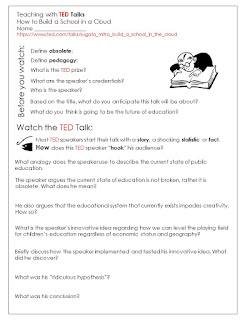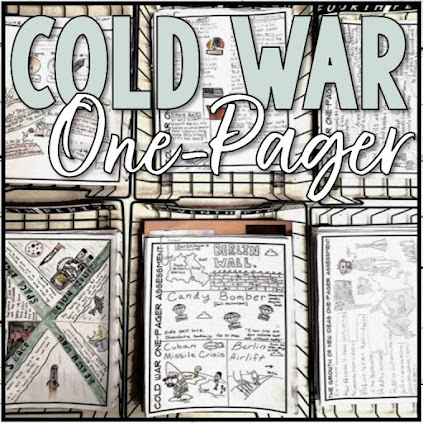Problem-Based Learning in Social Studies
This month my Social Studies students are undertaking perhaps their biggest challenge to-date. I posed a "Big Question" to them last week. The question was, "What do you think are the biggest problems facing humanity today and what can be done to solve those problems?"
We brainstormed lists. Each student had to come up with a minimum of five problems. None of my students had any problem coming up with five examples. Many recalled examples we discussed in their World Studies class as freshmen. (Proud teacher moment.)
Here is a sampling of what they came up with:
hate, poverty, hunger, disease, violence, war, genocide, terrorism, refugee crisis, sexism, racism, homophobia, intolerance, ignorance, unequal access/lack of access to health care, gender-based violence, homelessness, greed, slavery, sex trafficking, slavery, pollution, climate change, apathy, fear, unequal access to education, substance abuse, sustainable energy
We also discussed solutions. We discussed documentaries we've watched and books we've read about people working to make a difference. Many of my students recalled the film and book "Half the Sky" from their freshmen year. Many remembered TED Talks we've watched together in World Studies, United States History, and English courses including "Billions in Change" and 60 Minute segments about Darfur and child hunger. Some of my students who've taken Civil Rights History with me shared ideas they learned in class with regard to the work done by abolitionists and civil rights activists.
To inspire more ideas, we watched one of my favorite TED Talks, Sugata Mitra's, Build a School in a Cloud. We spent two days watching and discussing the talk. In addition, I created a lesson based on the talk. We visited his School in the Cloud page and reviewed some of the "Big Questions" students have posted there.
https://www.theschoolinthecloud.org/
My lesson:
https://www.teacherspayteachers.com/Product/TED-Talk-Lesson-Build-a-School-in-a-Cloud-3073852
I'm excited to get back to school and continue with the unit. (We are currently on Spring Break). When we return, we plan to spend some more time exploring how others are working on solving the world's most challenging problem's facing humanity. We will spend some time in the library and some time exploring online. By the end of next week I hope to start the next phase of the unit- the essay writing phase. I am going to set up pre-writing stations to help facilitate the process. Each student is going to narrow their focus to one problem and write an essay describing the problem and what steps they think should be taken to alleviate that problem.
I'm excited to see what my students come up with!
We brainstormed lists. Each student had to come up with a minimum of five problems. None of my students had any problem coming up with five examples. Many recalled examples we discussed in their World Studies class as freshmen. (Proud teacher moment.)
Here is a sampling of what they came up with:
hate, poverty, hunger, disease, violence, war, genocide, terrorism, refugee crisis, sexism, racism, homophobia, intolerance, ignorance, unequal access/lack of access to health care, gender-based violence, homelessness, greed, slavery, sex trafficking, slavery, pollution, climate change, apathy, fear, unequal access to education, substance abuse, sustainable energy
We also discussed solutions. We discussed documentaries we've watched and books we've read about people working to make a difference. Many of my students recalled the film and book "Half the Sky" from their freshmen year. Many remembered TED Talks we've watched together in World Studies, United States History, and English courses including "Billions in Change" and 60 Minute segments about Darfur and child hunger. Some of my students who've taken Civil Rights History with me shared ideas they learned in class with regard to the work done by abolitionists and civil rights activists.
To inspire more ideas, we watched one of my favorite TED Talks, Sugata Mitra's, Build a School in a Cloud. We spent two days watching and discussing the talk. In addition, I created a lesson based on the talk. We visited his School in the Cloud page and reviewed some of the "Big Questions" students have posted there.
https://www.theschoolinthecloud.org/
My lesson:
https://www.teacherspayteachers.com/Product/TED-Talk-Lesson-Build-a-School-in-a-Cloud-3073852
I'm excited to get back to school and continue with the unit. (We are currently on Spring Break). When we return, we plan to spend some more time exploring how others are working on solving the world's most challenging problem's facing humanity. We will spend some time in the library and some time exploring online. By the end of next week I hope to start the next phase of the unit- the essay writing phase. I am going to set up pre-writing stations to help facilitate the process. Each student is going to narrow their focus to one problem and write an essay describing the problem and what steps they think should be taken to alleviate that problem.
I'm excited to see what my students come up with!




Comments